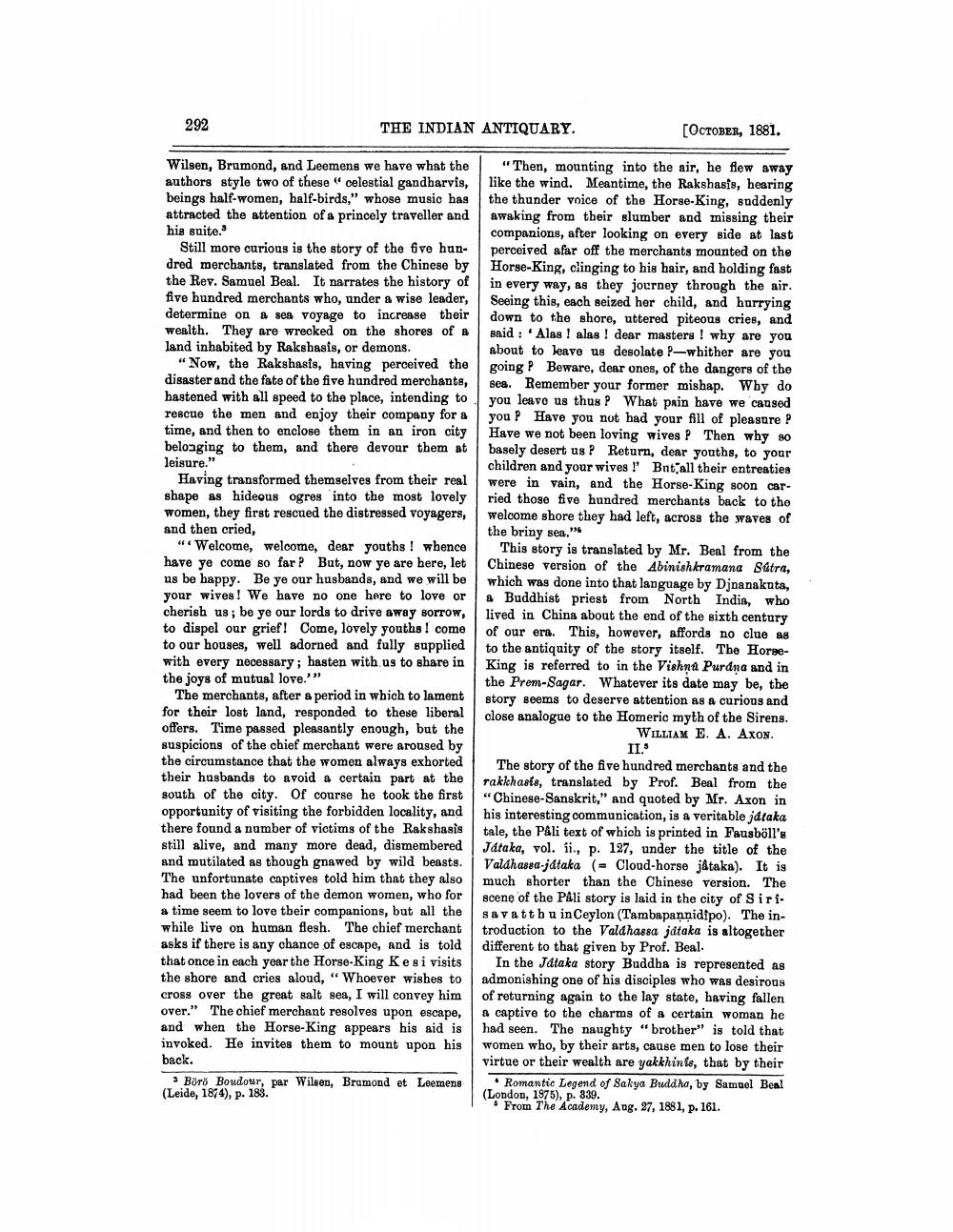________________
292
THE INDIAN ANTIQUARY.
[OCTOBER, 1881.
Wilsen, Brumond, and Leemens we have what the "Then, mounting into the air, he flew away authors style two of these celestial gandharvis, like the wind. Meantime, the Rakshasis, hearing beings half-women, half-birds," whose music has the thunder voice of the Horse-King, suddenly attracted the attention of a princely traveller and awaking from their slumber and missing their his suite.
companions, after looking on every side at last Still more curious is the story of the five hun- perceived afar off the merchants mounted on the dred merchants, translated from the Chinese by Horse-King, clinging to his hair, and holding fast the Rev. Samuel Beal. It narrates the history of in every way, as they journey through the air. five hundred merchants who, under & wise leader, Seeing this, each seized her child, and hurrying determine on a sea voyage to increase their down to the shore, uttered piteous cries, and wealth. They are wrecked on the shores of a said. Alas! alas ! dear masters ! why are you land inhabited by Rakshasis, or demons.
about to leave us desolate P-whither are you "Now, the Rakshasis, having perceived the going P Beware, dear ones, of the dangers of the disaster and the fate of the five hundred merchants, sea. Remember your former mishap. Why do hastened with all speed to the place, intending to you leave us thus ? What prin have we caused rescue the men and enjoy their company for a you P Have you not bad your fill of pleasure ? time, and then to enclose them in an iron city Have we not been loving wives P Then why 80 belonging to them, and there devour them at basely desert us ? Return, dear youths, to your leisure."
children and your wives !' But all their entreaties Having transformed themselves from their real were in vain, and the Horse-King soon carshape as hideous ogres into the most lovely ried those five hundred merchants back to the women, they first rescued the distressed voyagers, welcome shore they had left, across the waves of and then cried,
the briny sea." **Welcome, welcome, dear youths! whence This story is translated by Mr. Beal from the have ye come so far? But, now ye are here, let Chinese version of the Abinish kramana Sútra, us be happy. Be ye our husbands, and we will be which was done into that language by Djnanakuta, your wives! We have no one here to love or | Buddhist priest from North India, who cherish us; be yo our lords to drive away sorrow, lived in China about the end of the sixth century to dispel our grief! Come, lovely youths I come of our era. This, however, affords no clue as to our houses, well adorned and fully supplied to the antiquity of the story itself. The Horsewith every nocessary; basten with us to share in King is referred to in the Vishna Purdna and in the joys of mutual love.""
the Prem-Sagar. Whatever its date may be, the The merchants, after a period in which to lament
story seems to deserve attention as a curious and for their lost land, responded to these liberal
close analogue to the Homeric myth of the Sirens. offers. Time passed pleasantly enough, but the
WILLIAM E. A. Axon. suspicions of the chief merchant were aroused by
II.S the circumstance that the women always exhorted
The story of the five hundred merchants and the their husbands to avoid a certain part at the rakkhasís, translated by Prof. Beal from the south of the city. Of course he took the first "Chinese-Sanskrit," and quoted by Mr. Axon in opportunity of visiting the forbidden locality, and his interesting communication, is a veritable jdtaka there found a number of victims of the Rakshasis tale, the PAli text of which is printed in Fausböll's still alive, and many more dead, dismembered Jataka, vol. 1, p. 127, under the title of the and mutilated as though gnawed by wild beasts. Valdhassa-jdtaka (- Cloud-horse jataka). It is The unfortunate captives told him that they also much shorter than the Chinese version. The had been the lovers of the demon women, who for scene of the PAli story is laid in the city of Siri. a time seem to love their companions, but all the savattbu in Ceylon (Tambapannidipo). The inwhile live on human flesh. The chief merchant troduction to the Valdhassa jdtaka is altogether asks if there is any chance of escape, and is told different to that given by Prof. Beal. that once in each your the Horse-King Kesi visits In the Jdtaka story Buddha is represented as the shore and cries aloud, "Whoever wishes to admonishing one of his disciples who was desirous cross over the great salt sea, I will convey him of returning again to the lay state, having fallen over." The chief merchant resolves upon escape, a captive to the charms of a certain woman he and when the Horse-King appears his aid is had seen. The naughty "brother" is told that invoked. He invites them to mount upon his women who, by their arts, cause men to lose their back.
virtue or their wealth are yakkhin is, that by their Boro Boudour, par Wilsen, Brumond et Leemens • Romantic Legend of Sakya Buddha, by Samuel Beal (Leide, 1874), p. 183.
(London, 1975), p. 339. * From The Academy, Ang. 27, 1881, p. 161.




